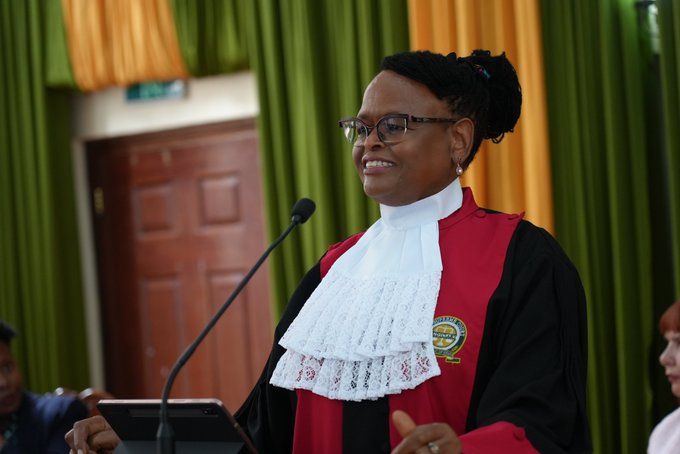
 Newly qualified lawyers take oath at Milimani Law Courts on August 5, 2025 [JUDICIARY/X]
Newly qualified lawyers take oath at Milimani Law Courts on August 5, 2025 [JUDICIARY/X]A fresh cohort of 242 newly qualified lawyers has been admitted to the Roll of Advocates in a ceremony held at the Milimani Law Courts, Nairobi.
Chief Justice Martha Koome presided over the event, urging the new entrants to the legal profession to uphold the highest standards of integrity and service to the people of Kenya.
“With today’s cohort, the number of advocates admitted this year rises to 950, with one final group still under processing by the Kenya School of Law and the Council of Legal Education,” the Judiciary announced on its official platforms.
The CJ described the occasion as not just a career milestone but a constitutional responsibility.
“Each new advocate we admit represents the future of the legal profession, the vitality of the rule of law, and the strength of our democracy,” she said.
 CJ Martha Koome during the event [JUDICIARY/X]
CJ Martha Koome during the event [JUDICIARY/X]Koome reminded the group of the weight of the oath they had taken, noting that it was far from a formality.
“This morning, each of you took a sacred oath. It is worth pausing to reflect on what that means. The oath is not mere words recited in formality. It is a covenant; a solemn promise between you and the people of Kenya,” she stated.
She urged them to let their practice be guided not just by legality but by justice, fairness, and what is morally right.
“The people of Kenya are looking to you, not just to interpret the law, but to safeguard democracy, to defend the Constitution, to protect rights, and to serve as a moral compass in times of uncertainty,” she emphasised.
 Newly qualified lawyers take oath at Milimani Law Courts on August 5, 2025 [JUDICIARY/X]
Newly qualified lawyers take oath at Milimani Law Courts on August 5, 2025 [JUDICIARY/X]Chief Registrar of the Judiciary Winfridah Mokaya also addressed the ceremony, pointing to the stark gaps in access to justice.
She revealed that Kenya currently has only 202 judges serving a population of 57 million—one judge for every 279,000 citizens—against international best practice of one judge for every 50,000 to 100,000 people.
"The country also has 561 magistrates, translating to a ratio of one for every 98,000 Kenyans. The imbalance is stark, and it explains why case backlogs persist,” she said.
However, Mokaya framed the statistics as opportunities rather than obstacles for the new advocates.
She called on them to be part of building a judiciary that is more responsive and accessible, in line with the Judiciary’s Social Transformation through Access to Justice (STAJ) Blueprint.
“I urge you to see your admission not as the end of a long journey, but as the beginning of a career that can profoundly impact communities and strengthen the rule of law,” she said.
The latest admissions mark a boost to the legal fraternity.












